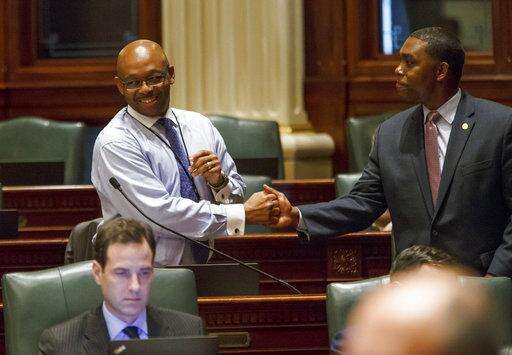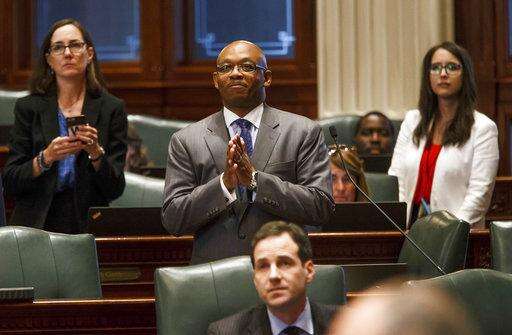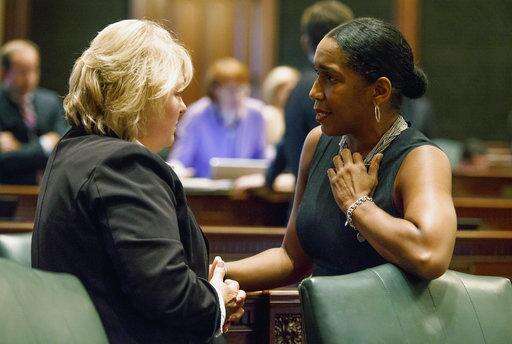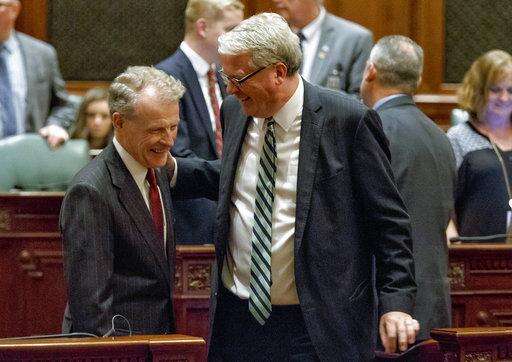Illinois Gov. Bruce Rauner, left, shakes hands with Illinois State Rep. Will Davis, D-Homewood, on the floor of the Illinois House after the education funding bill Davis sponsored passed on the second attempt during a special session at the Illinois State Capitol, Monday, Aug. 28, 2017, in Springfield, Ill. The Illinois House approved an education funding plan Monday that will increase state money for all districts, reduce disparities between rich and poor schools and provide $75 million in tax credits for people who donated to private school scholarships. (Justin L. Fowler/The State Journal-Register via AP)
The Associated Press
SPRINGFIELD, Ill. (AP) - The Illinois Senate on Tuesday approved a school funding overhaul that supporters hailed as "historic," saying it will increase aid to all of the state's more than 800 districts and eliminate large disparities between rich and poor schools.
Senators voted 38-13 to send the measure to Republican Gov. Bruce Rauner, who has said he'll sign the bill quickly to get money to districts starting a new school year. The House passed the bill late Monday.
Democratic Sen. Andy Manar, the bill's sponsor, said the plan will fund schools fairly "for the first time in decades."
"There will not be another generation of students that are subjected to inequity - the worst in the country - after this bill becomes law," he said. "That's something worth saying today."
Lawmakers have tried unsuccessfully for years to replace the current system. This year's state budget required for the first time that the formula be changed, and provided an additional $350 million to help pay for it.
No money can go to districts, however, until a new plan is in place. Although school officials have said they will be able to open classrooms for the new school year, many districts have worried they would run out of money if a plan wasn't approved soon.
The legislation passed Tuesday also provides $75 million in tax credits for people who contributed to private school scholarships.
Teacher unions and some school officials oppose the credits, saying taxpayer money shouldn't be used to fund private schools. They fear the scholarships - which would benefit a maximum of 6,000 students - will reduce enrollment at public schools, some of which are struggling to maintain enough students to stay open.
The tax credit program will expire after five years if lawmakers don't extend it. The credits would be worth 75 percent of a taxpayer's annual contributions to a scholarship fund, with a maximum credit of $1 million annually. The money may be donated to a specific school but not to a specific student.
Students receiving the scholarships must have a household income of less than 300 percent of the federal poverty level, or about $73,000 annually for a family of four.
Under Illinois' current system, districts must rely heavily on property taxes to fund schools. That's created large differences in per-student funding, with some wealthier districts spending four times more per student than districts with less property tax wealth.
Under the new plan, the state will determine how much money each district needs to adequately educate its students, taking into consideration the number who live in poverty or who need special education services. The state then looks at how much money the district is able to generate from property taxes, and directs state aid first to districts that need the most money to reach their per-student spending target.
The legislation also provides money to help Chicago Public Schools make payments to its teacher pension funds, as Illinois does for other districts, and gives districts relief from some state mandates, such as allowing them to offer fewer days of physical education each week.
__
Associated Press writer Sophia Tareen in Chicago contributed to this report.
___
Follow Sara Burnett on Twitter at https://twitter.com/sara_burnett. Sign up for the AP's weekly newsletter showcasing our best reporting from the Midwest and Texas at http://apne.ws/2u1RMfv .
Illinois Speaker of the House Michael Madigan, D-Chicago, looks out over the floor the Illinois House as they get set to vote on the education funding bill for a second time during a special session at the Illinois State Capitol, Monday, Aug. 28, 2017, in Springfield, Ill. The Illinois House approved the education funding plan Monday that will increase state money for all districts, reduce disparities between rich and poor schools and provide $75 million in tax credits for people who donated to private school scholarships. (Justin L. Fowler/The State Journal-Register via AP)
The Associated Press

Illinois State Rep. Will Davis, D-Homewood, left, celebrates with Illinois State Rep. La Shawn Ford, D-Chicago after the education funding bill Davis sponsored passed on the second attempt during a special session at the Illinois State Capitol, Monday, Aug. 28, 2017, in Springfield, Ill. The Illinois House approved the education funding plan Monday that will increase state money for all districts, reduce disparities between rich and poor schools and provide $75 million in tax credits for people who donated to private school scholarships. (Justin L. Fowler/The State Journal-Register via AP)
The Associated Press

Illinois State Rep. Will Davis, D-Homewood, watches the votes come in on the education funding bill he sponsored on the floor of the Illinois House during a special session at the Illinois State Capitol, Monday, Aug. 28, 2017, in Springfield, Ill. The Illinois House approved an education funding plan Monday that will increase state money for all districts, reduce disparities between rich and poor schools and provide $75 million in tax credits for people who donated to private school scholarships. (Justin L. Fowler/The State Journal-Register via AP)
The Associated Press

Illinois Stater Rep. Terri Bryant, R-Murphysboro, left, talks with Illinois State Rep. Juliana Stratton, D-Chicago on the floor of the Illinois House during a special session for education funding at the Illinois State Capitol, Monday, Aug. 28, 2017, in Springfield, Ill. The Illinois House approved the education funding plan Monday that will increase state money for all districts, reduce disparities between rich and poor schools and provide $75 million in tax credits for people who donated to private school scholarships. (Justin L. Fowler/The State Journal-Register via AP)
The Associated Press

Illinois Speaker of the House Michael Madigan, D-Chicago, left, visits with Illinois House Minority Leader Jim Durkin, R-Western Springs, on the floor of the Illinois House after the education funding bill passed on the second attempt during a special session at the Illinois State Capitol, Monday, Aug. 28, 2017, in Springfield, Ill. The Illinois House approved the education funding plan Monday that will increase state money for all districts, reduce disparities between rich and poor schools and provide $75 million in tax credits for people who donated to private school scholarships. (Justin L. Fowler/The State Journal-Register via AP)
The Associated Press

Illinois State Sen. Andy Manar, D-Bunker Hill, watches the debate on the education funding bill from the floor of the Illinois House during a special session at the Illinois State Capitol, Monday, Aug. 28, 2017, in Springfield, Ill. The Illinois House approved the education funding plan Monday that will increase state money for all districts, reduce disparities between rich and poor schools and provide $75 million in tax credits for people who donated to private school scholarships. (Justin L. Fowler/The State Journal-Register via AP)
The Associated Press